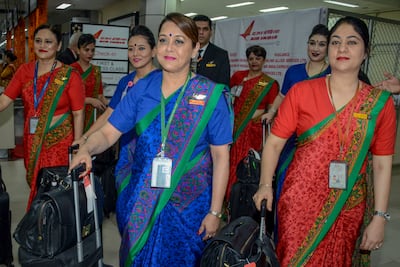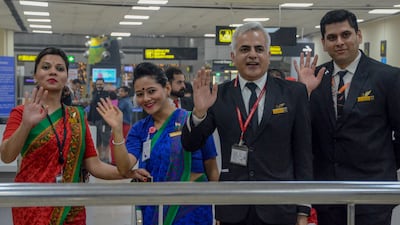Air India is facing criticism after unveiling a list of grooming rules for cabin crew members that bar them from wearing religious accessories and require men with receding hairlines to shave their heads every day for "a full bald look”.
The former state-run airline, which was acquired earlier this year by the country's oldest and largest conglomerate, Tata Sons, issued the guidelines — part of the Cabin Crew Handbook — on Thursday.
In a statement that has gone viral on social media, the airline directed hundreds of crew members to avoid religious rings engraved with stones and pearls.
It also told them to not wear nose pins and rings, necklaces and threads normally worn around the neck and wrists.
The airline asked female flight attendants to wear only round diamond earrings and banned pearl earrings. Finger rings measuring 1cm in width will be allowed.
Female flight attendants have also been asked to wear sheer, calf-length stockings that match their skin tone.
The airline has instructed cabin crew members going grey to have their hair “regularly coloured in natural shade” while male flight attendants who are losing their hair should shave it for a "bald" look. However, crew cuts are not permitted.
“Crew with U and V-shape hairline on crown, visible scalp and large bald patches must keep a full bald look. Head must be shaved daily,” the guidelines read.
The flight attendants have also been asked to use antiperspirant or deodorant together with their choice of perfume, but to avoid heavily scented perfumes.

The guidelines, particularly the ban on items related to religion, have led to widespread criticism on social media, where some described them as unnecessary and outrageous.
“In days when body positivity, personal choice and freedom of expression is bringing positive change, it’s a pity airlines still want to impose a strict uniform with uncomfortable hairdos, mandatory use of hair gel and colour, and even dictate the shape of earrings,” Twitter user Richa S said.
Some also said the rules discriminate against people suffering from alopecia, an autoimmune disorder that causes hair loss on the scalp, face and sometimes on other areas of the body.
Air India was formed by Jehangir Ratanji Dadabhoy Tata, an Indian aviator and former chairman of Tata Sons, in 1932.
The airline introduced an Anglo-Indian look, with female flight attendants that wore tailored European dresses and angled hats in 1946.
It was bought by the Indian government in 1953 under the Air Corporations Act and by the 1960s, as part of their rebranding, it introduced sarees as the official uniform for female crew members.
However, Air India ran at a loss for decades and accumulated huge amount of debt as New Delhi struggled to keep it afloat and explored opportunities to privatise the airline.
Tata Sons won the bid to take over the embattled airline in October last year, about 70 years after it was nationalised.
The Indian government sold the airline to the conglomerate after concluding a 180-billion rupee ($2.39 billion) deal in October for a 100 per cent stake in the company.
Since then, Tata Sons has been trying to transform the airline and has announced a several measures, including plans to progressively introduce 30 new aircraft to boost its domestic and international network.


